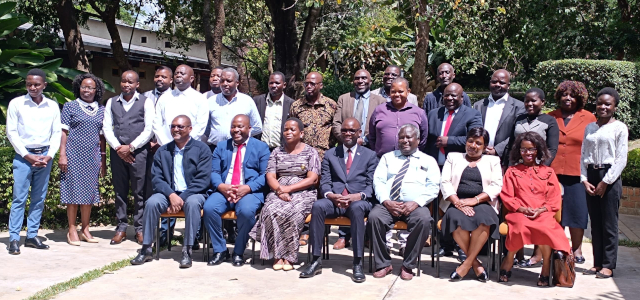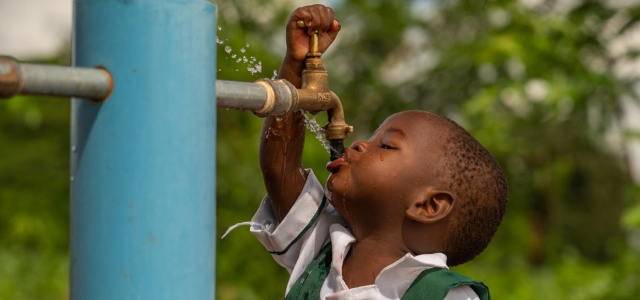Held from 9 - 10 April 2025 in Lilongwe, the meeting was organised by the Ministry of Water and Sanitation with technical support from Global Water Partnership Southern Africa (GWPSA). The meeting brought together a diverse range of stakeholders, including representatives from Malawi’s Nationally Designated Authority (NDA), officials from key ministries and departments linked to water, sanitation, and climate change and technical experts from GWPSA.
The workshop discussed strategies to enhance capacity for climate finance programming, strengthening water investment project pipelines, and aligning national plans with global climate action priorities.
In his opening remarks, Mr. Elias Chimlambe, Principal Secretary for Water and Sanitation, reaffirmed Malawi’s commitment to water security and climate adaptation efforts.
“This workshop is an opportunity for our sector to brainstorm game-changing water and sanitation projects that could benefit from climate financing. As you are aware, there are global financing cuts which are a real threat to the achievement of SDG 6. We must pursue every financing opportunity with all seriousness,” said Mr. Chimlambe.

Mr. Elias Chimlambe, Principal Secretary - Ministry of Water and Sanitation (seated centre) in a group photo with Malawi’s water sector stakeholders during kick-off meeting
The workshop provided Malawi’s water sector an opportunity to consolidate gaps and align project ideas with the Malawi 2063 Vision, the Nationally Determined Contributions (NDCs), and the Malawi 2063 First 10-Year Implementation Plan (MIP-1).
“Malawi aims at achieving universal access to safe water and sanitation through guiding blocks such as the Malawi 2063 agenda and the Malawi first 10-year implementation plan (MIP-1). The Ministry has outlined a number of priority areas for both water supply, water resources and sanitation in alignment with the country’s vision and strategic plans,” explained Dr. Max Wengawenga, Deputy Director of Planning in Malawi’s Ministry of Water and Sanitation, who also made a presentation on the priorities.
A World Health Organization and UNICEF joint monitoring 2023 report revealed that Malawi still has challenges around water and sanitation. Some of the findings included the following:
- 30% of households, representing 7 million persons, do not have basic drinking water
- 76% of the population (14 million people) are using unimproved sanitation
- 43% of rural populations (6.8 million people) and 49% of urban persons (1.4 million people) populations had access to at least basic sanitation
- 17% of rural populations (2,698,698 people) and 7% of urban populations (211,663 people) have no handwashing facility on their premises
- 92% (17 million persons) do not practice handwashing with soap and water
- >24% of public institutions (health facilities, learning centres etc) do not have access to climate-resilient WASH facilities.
Malawi is one of 15 African Union Member States participating in the AU AIP Multi-Country GCF Readiness Project, which is designed to build national capacities for accessing and implementing GCF resources for water-related climate action.
“This initiative stands to support AU Member States to unlock climate finance. The project seeks to build their capacity for water investment planning to address climate change risks that affect the water sector. The programme will enhance access to climate finance so that there can be more investments. This is part of efforts to bridge the annual investment gap of about $30 billion, which exists in the water sector,” said Mr. Joseph Mbinji, Programme Officer for the AU AIP Multi-Country GCF Readiness Project at GWPSA.
Through group discussions and technical sessions, the workshop in Malawi produced draft concepts for projects aimed at addressing key water challenges. Among the project ideas discussed were:
- Solar-Powered Groundwater Resilience Water Supply Systems
- Integrated Surface and Groundwater Climate Adaptation Projects
- Sustainable Water Access for Market Centres and Public Institutions
- Real-time Groundwater Monitoring Systems
- Climate Shock Management using Managed Aquifer Recharge
- Sanitation Infrastructure Projects, including faecal sludge treatment and school toilet systems
These initiatives will feed into Malawi’s broader Water Investment Programme (WIP), currently under development with support from the World Bank.
"A key takeaway was the need to ensure synergy between the AU AIP framework and Malawi’s Water Investment Programme to maximise impact and avoid duplication. As GWPSA, we are happy that the World Bank is already supporting the process of developing the WIP, which is one of the deliverables under the GCF Readiness Project. We will collaborate with them to make this a success," explained Mrs. Debora Muheka, National Technical Coordinator for the AU AIP Multi-Country GCF Readiness Project in Malawi.
The workshop concluded with a strong call to action from Mr. Stanley Kamtukule, Deputy Director for Water Resources, who thanked participants for their dedication and emphasised the importance of sustained collaboration.
“This is only the beginning. With GCF support and the AIP framework guiding us, Malawi is well on its way to unlocking climate finance that will improve water security and the lives of our people,” he noted.
Follow-up actions include the development of pre-concept notes by the Ministry of Water and Sanitation, feedback from the NDA on nominated Direct Access Entities (DAEs), and realignment of terms of reference for consultants working on the WIP to align with AIP guidelines on the development of national Water Investment Programme.
Photos courtesy of Malawi’s Ministry of Water & Sanitation
